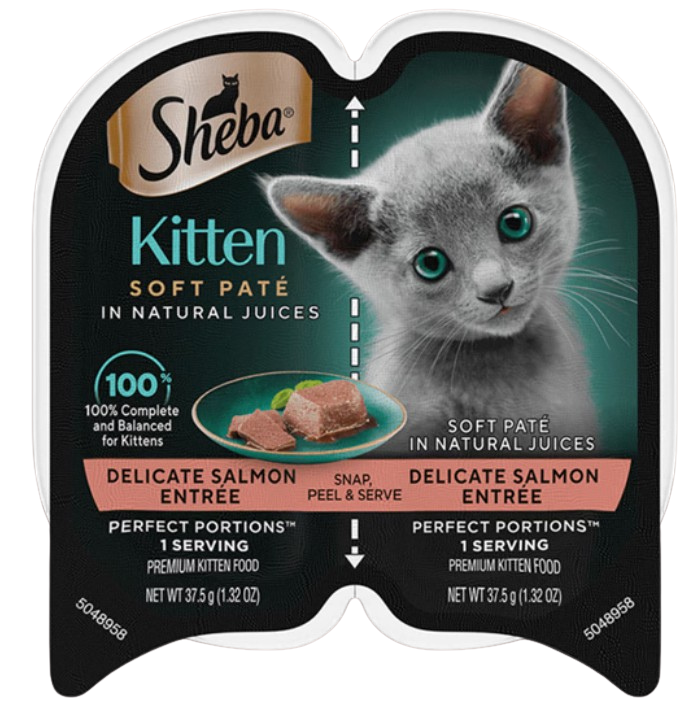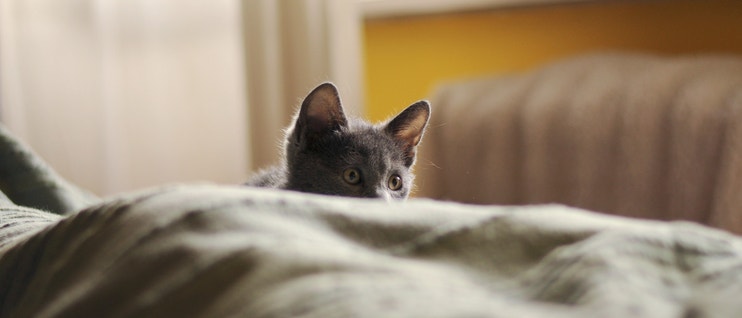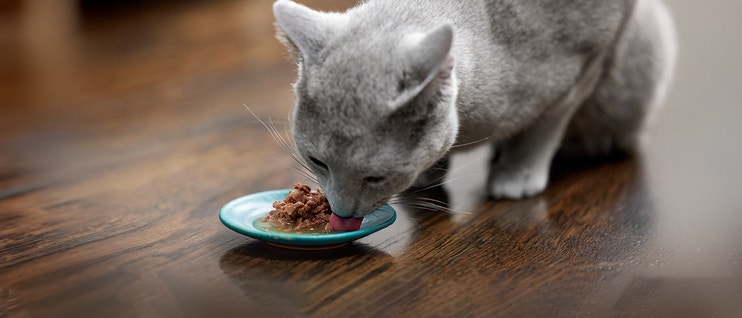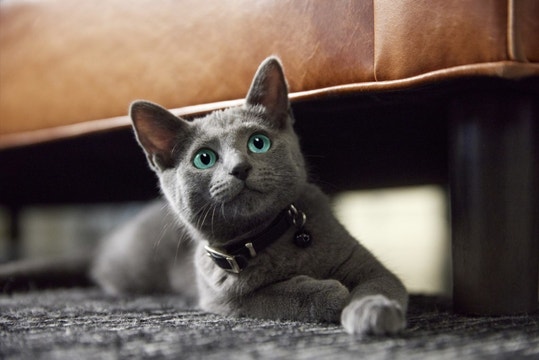
How to Feed a Kitten: Essential Tips for a Healthy Start
Congratulations on welcoming a kitten into your home! Your new feline friend will bring you joy and love for many years, provided they get the care and nutrition they need. But as a new cat parent, figuring out what and how to feed your kitten can be overwhelming.
That’s why we’ve put together this guide to help you navigate the world of kitten nutrition. We’ll look at the nutrients your kitten(open in new tab) needs to thrive and share helpful tips for establishing healthy eating habits.

Understanding Your Kitten’s Nutritional Needs
Kittens have specific dietary requirements. They need a complete and balanced diet of proteins, fats, fiber, vitamins, and minerals to support their rapid growth and development.
Here’s a breakdown of their nutritional needs and why they’re important for your kitten:
Protein
Proteins are the building blocks of your kitten’s body. They help with muscle development, tissue repair, and maintaining a healthy immune system. Protein sources for kittens include chicken, salmon, and beef. Look for quality protein sources.
Fat
Healthy fat provides energy for your kitten’s active lifestyle and helps them properly absorb fat-soluble vitamins. Fish oil is an excellent source of fat for kittens, as it also contains beneficial Omega-3 fatty acids.
Fiber
While your kitten doesn’t need carbohydrates from grain or corn, fiber can help keep their digestive system running smoothly. Look for food with natural sources of fiber, like guar gum or beet pulp.
Vitamins and Minerals
These essential nutrients support bone growth and eye health. Some vital vitamins for kittens include Vitamin A, Taurine, Zinc, and Calcium. They also need Docosahexaenoic Acid (DHA) to help their brain grow properly.
Table of Contents
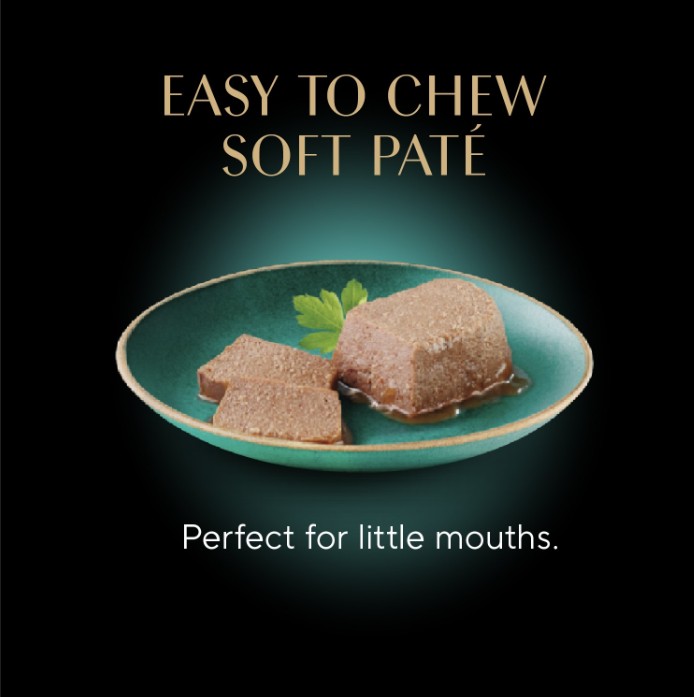
What to Feed Your Kitten
To ensure your kitten gets the right balance of nutrients, you’ll want to feed them high-quality, nutritious kitten food, like SHEBA® Kitten Soft Paté(open in new tab).
Here’s why:
Complete and balanced nutrition: SHEBA® Kitten Paté is specially formulated to meet the nutritional needs of growing kittens. It includes the right amount of protein, fats, fiber, vitamins, and minerals to keep your kitten growing well with plenty of energy to play(open in new tab).
Convenience: SHEBA® Kitten Paté comes in easy-to-serve packaging. It’s pre-portioned into individual trays, so you won’t have to worry about half-used cans of cat food turning rancid in the fridge.
High-quality ingredients(open in new tab): SHEBA® Kitten Paté doesn’t include grains, corn, artificial flavors, or soy* (*Trace amounts may be present due to cross-contact during manufacturing). It has high-quality protein as the first ingredient.
Sustainable sourcing: We’re committed to environmental responsibility(open in new tab). As part of that commitment, we source our seafood from sustainable fishing suppliers, as evaluated by the Marine Stewardship Council (MSC).
Hydration: Kittens, like adult cats, love wet food(open in new tab). It’s hydrating, which is especially important for kittens.
Easy chewing: Wet food is easier on your kitten’s developing teeth and gums than dry food. Kibble can be too hard for their little mouths, leading to discomfort or even broken teeth.
Now that you know what to feed your kitten, let’s look at what your adorable kitty shouldn’t eat.
What Not to Feed Your Kitten
Certain foods are dangerous for your kitten. As a responsible pet parent, it’s important to be aware of potential hazards(open in new tab) and keep them out of your kitten’s reach.
Some common foods you should never feed your kitten include:
Chocolate
Onions and garlic
Grapes and raisins
Table scraps
Cooked chicken bones
Caffeine
Cow milk
If your kitten accidentally eats one of these things, call your veterinarian right away. They can provide guidance on how to handle the situation and determine if medical intervention is necessary.
How Much to Feed Your Kitten
Kittens have tiny stomachs. They need to eat small amounts of food several times daily(open in new tab), especially when they’re really young. At first, you may need to feed them four to seven times a day.
But as they grow, they’ll be able to handle larger portions of food. By the time they’re about six months old, they’ll be ready for twice-a-day meals.
Your kitten’s nutritional needs vary based on breed, activity level, and genetics. Refer to the packaging information on their food to get a rough idea of how much food to offer. Then, talk to your vet about any adjustments you may need to make.
For example, when offering SHEBA® Kitten Soft Paté - Chicken(open in new tab), the feeding guidelines recommend giving your kitten 4-7 servings daily.
Start with an amount in that range that seems right for your kitten. Then, monitor their condition over time. They may need more food if they lose weight or become lethargic. But if they’re gaining too much weight, they may need less.
If you have any questions about how much your kitten needs, consult your veterinarian. They can provide individualized feeding recommendations.
Tips on How to Feed Your Kitten
Mealtime just might be your kitten’s favorite time of day, though playtime(open in new tab) comes in a close second! But with a new kitten, finding a feeding routine that works best for both of you can take time.
Here are some tips to help you navigate this aspect of kitten care.
Create a Feeding Schedule
Cats (and kittens) thrive on routine. Establishing a consistent feeding schedule can help your kitten feel secure and comfortable in their new home.
A schedule can also ensure your growing kitten gets enough calories and nutrients and makes it harder for your cat to overeat. They won’t have free access to food to nibble on throughout the day.
Set up a Feeding Station
Designate a specific area in your home for mealtime. Your kitten will soon associate this spot with food.
Make sure the area is clean and easily accessible for your kitten. Put their food and water bowls in a quiet, low-traffic spot to help them feel comfortable while eating. And consider placing a mat under their bowls to keep the area tidy and to make clean-up easier.
Offer Plenty of Water
As we mentioned earlier, kittens need plenty of fluids to stay healthy. Ensure they always have access to clean, fresh water.
If your kitten dislikes drinking, consider investing in a cat water fountain. These offer a source of moving water that many cats find more appealing. It may encourage them to drink more.
Be Mindful of Treats
While there’s nothing wrong with treating your kitten for good behavior or as a special reward, it’s important to offer treats in moderation. Treats shouldn't account for too much of your cat’s daily caloric intake.
Choose healthy snacks and treats made with quality protein. You don’t want to fill your kitten with empty calories!
Have a Plan for Switching to Adult Cat Food
Once your kitten is fully grown, they’ll no longer need special kitten food. At this point, you can transition to adult cat food. But you don’t want to switch cold turkey, as that can cause digestive upset and discomfort.
Instead, mix a small amount of adult cat food with their kitten food. Gradually increase the ratio for a week or so until they’re eating only the adult cat food.
Pick cat food from the same brand as their kitten food for an even smoother transition. This will provide a similar taste and texture, making it easier for your cat to adjust. SHEBA® PERFECT PORTIONS™(open in new tab) is a popular option.
Feeding Your Kitten with Confidence
The tips above will help you know how to feed your kitten with confidence, so let’s review:
Choose a high-quality kitten food (like SHEBA® Kitten Soft Paté(open in new tab))
Create a feeding schedule instead of free feeding
Keep fresh water accessible at all times
Have a plan to meet your cat’s changing nutritional needs as they grow
By following these feeding guidelines, you’ll help ensure your kitten grows into a healthy and happy cat, ready to seize each meowment!
For even more feline-raising tips, check out the other helpful articles from SHEBA®(open in new tab).
